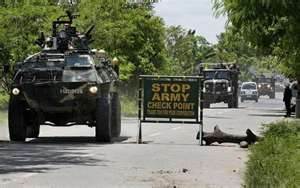Messed up peace agreement
 Relatives and allies of the Moro Islamic Liberation Front (MILF) are overjoyed over the Philippine government's move that finally paved the way for the approval of the frameworks that created the Bangsamoro State in Mindanao.
Relatives and allies of the Moro Islamic Liberation Front (MILF) are overjoyed over the Philippine government's move that finally paved the way for the approval of the frameworks that created the Bangsamoro State in Mindanao. While the moros are celebrating the success of this peace agreement, I'm sure some sectors of the Philippine society are a bit lukewarm to the idea of setting up another autonomous government in place of the Autonomous Region for Muslim Mindanao (ARMM), which, in essence, was the same set up except for the officials that will run the Bangsamoro government.
 To many Moros in Mindanao, the creation of the Bangsamoro State was a crowning glory. But to most Filipinos, the junking of the ARMM was nothing but an insult to the time, efforts and money that were spent to seal off the Tripoli Agreement. I don't want to explore further into the nitty gritty on how the Tripoli Agreement was reached that led to the creation of the ARMM. But surely it was meant to attain a lasting peace in Mindanao like what the MILF has been harping about.
To many Moros in Mindanao, the creation of the Bangsamoro State was a crowning glory. But to most Filipinos, the junking of the ARMM was nothing but an insult to the time, efforts and money that were spent to seal off the Tripoli Agreement. I don't want to explore further into the nitty gritty on how the Tripoli Agreement was reached that led to the creation of the ARMM. But surely it was meant to attain a lasting peace in Mindanao like what the MILF has been harping about.Yes, for many years, peace was achieved, with the Moro National Liberation Front (MNLF) agreeing to observe the peace pact. But while most Mindanao residents were enjoying the benefits of the peace agreement, some patches of unrests were cropping up, especially with the evolvement of the Abu Sayyaf Group (ASG) whose motive was not really for anything else but to gain international notoriety for kidnappings of local and foreign tourists in exchange for cash.
While the successful implementation of the ARMM took off to a good start, a splinter group whose political idealism was different from what the MNLF had been espousing for formed its own group called the Moro Islamic Liberation Front, whose motive then was to create a pure Islamic State in Mindanao. After many years of battling the government forces, it finally realized its vision of having a Bangsamoro State to its own advantage.
The Philippine society was caught off-guard when it was learned that the Bangsamoro State will have its own armed forces, which made Sen. Panfilo Lacson to question one of the issues that embraces this provision. Will it allow the Bangsamoro State to create its own police forces, too?" Lacson asked the authorities. If this is true, the public may have been short-changed because of the near-sightedness of some members of the government peace negotiating panel who may have not scrutinized this issue at length. Otherwise, there was a one-way traffic when the frameworks of agreement were hammered out across the negotiating table.
We are aware that the government panel was composed of the bright minds capable of doing what they were supposed to do. However, the government side failed to insist that there's no need for a Bangsamoro armed forces because, under the Constitution, there must only be one Armed Forces of the Philippines and the Philippine National Police that will protect the sovereignty of the country from within and external aggressions. In the first place, what is there for the Bangsamoro State to protect when it is within the sovereign territory of the Philippines? Unless they wanted to protect their own interests and other agenda, the Bangsamoro needs its own armed forces. And with the 75 percent share in the internal revenue allotment, how could the Bangsamoro State not build up its infrastructures and armaments, too?
Undoubtedly, with the Bangsamoro State's capability, as mandated in the frameworks of agreement, to represent its government in the international communities, the public believes that it could also seek fundings to build up its military hardwares. There are no basis for this, but this is something possible in the remote future. Winning the first battle against the government, has it ever occurred to our government peace panel that this is not the last time that the Bangsamoro will set a pre-condition from government to serve its interests? We just pray that this is the last.


Comments